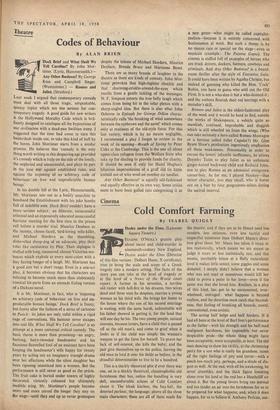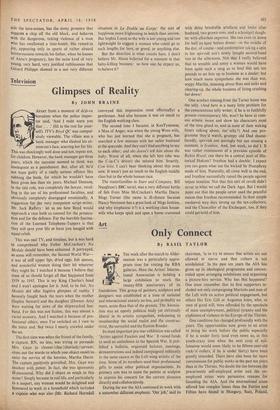Cold Comfort Farming
Cinema
By ISABEL QUIGLY
EUGENE O'Nuni.'s granite play about incest and child-murder in nineteenth-century New England, Desire under the Elms (Director of this film version : Delbert Hann; X certificate), tries to bring the scale and scope of a Greek tragedy into a modern setting. The facts of the story you can take at the level of tragedy or at the level of a News of the World court report. A farmer in his seventies, a terrible old ranter with hell-fire in his dreams, two wives dead and three sons he despises, marries a young woman as his third wife. He brings her home to the house where the son of his second marriage is waiting, with the same harsh, indomitable will his father showed in getting it, for the land that will one day be his. The two young people, natural enemies, become lovers, have a child that is passed off as the old man's, and come to grief when it looks as if the child was simply the woman's weapon to get the farm for herself. To prove her lack of self-interest, she kills the baby; and the pair give themselves up to the police, leaving the old man to lord it over his fields as before, in the dreadful determination to live to be a hundred.
This is a thickly theatrical plot if ever there was one, set in a thickly theatrical, claustrophobic old farmhouse that has, unless the handling is very deft, uncomfortable echoes of Cold Comfort about it. The bleak kitchen, the hay-loft, the deserted parlour; the language; above all the three main characters; these are all of them made for the theatre, and if they are to be filmed need less modern, less intimate, even less tactful and respectful treatment than Delbert Mann's direc- tion gives them. Mr. Mann has taken it more or less realistically, which means we are meant to judge it more or less realistically too; and this means, inevitably (since at a flatly naturalistic level it makes little sense), some giggles and some disbelief. I simply didn't believe that a woman who was not mad or monstrous would kill her child to prove a point to her lover—even if the point was that she loved him. Realism, in a play of this kind, has got to be surmounted, over- whelmed, outraged: what happens is beyond realism, and the direction must catch that beyond- ness, that feeling of breaking all bounds, moral, conventional, even artistic.
The acting half helps and half hinders. If it had all been at the level of Burl Ives's performance as the father—with his strength and his half-mad malignant harshness, his impossible but never despicable pride—the whole thing might have been acceptable; more acceptable, at least. The old man dancing to show his virility, at the christening party for a son who is really his grandson, raises all the right feelings of pity and terror—with a pinch too much pity, perhaps, and a shade of dis- gust as well. At the end, with all his awakening, he never crumbles, and the thick figure lowering alone over his land at the end has a Heathcliff air about it. But the young lovers bring too normal and too tender an air into the farmhouse for us to be prepared for what happens; and, when it does happen, for us to believe it. Anthony Perkins, out- side the love-scenes, has the stony presence that suggests a chip off the old block, and behaves with the dangerous, ticking violence of a man who has swallowed a time-bomb. His reined-in joy, appearing only in spurts of rather absurd boisterousness towards his father, when he knows of Anna's pregnancy, has the same kind of very Young, very hard, very justified ruthlessness that Gerard Philippe showed in a not very different situation in Le Diable au Corps: the sort of happiness more frightening to watch than sorrow. But Sophia Loren as the wife is too young and too lightweight to suggest a woman who could go to such lengths for love, or greed, or anything else.
But the direction is what counts here. I don't believe Mr. Mann believed for a moment in that baby-killing business : so how can he expect us, to believe it?





























 Previous page
Previous page